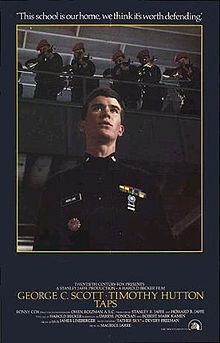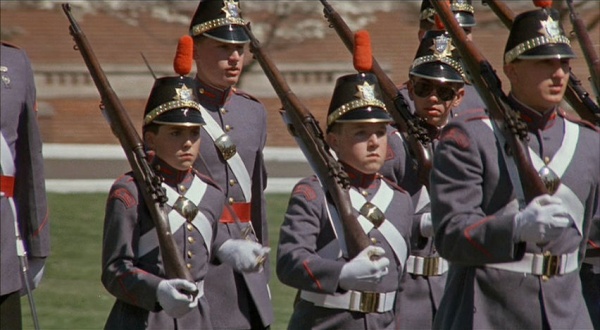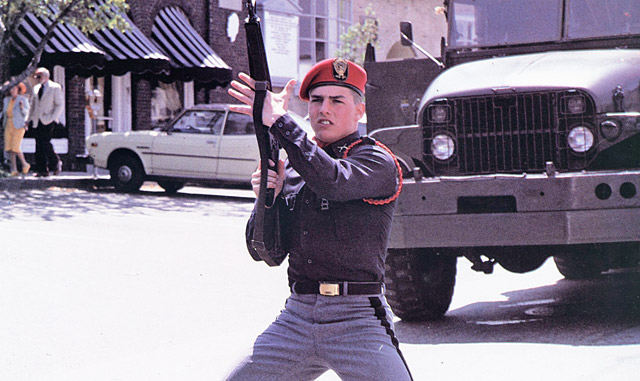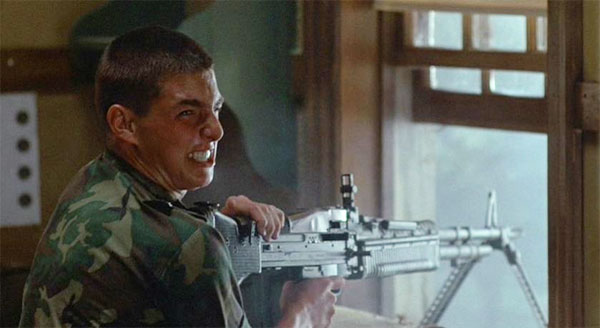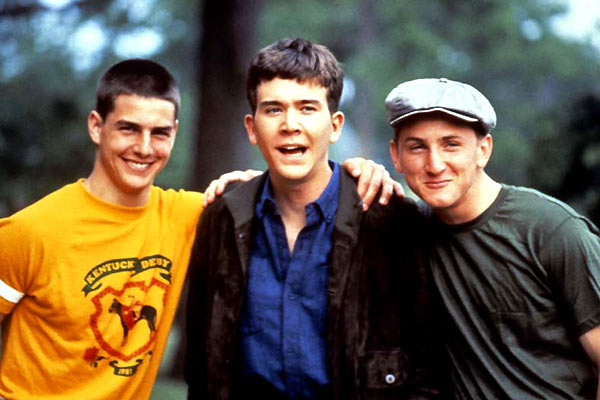The Actors Chewdio was established in 1984 by founding members (and legendary thespians) Francois Van Varenberg, Charles Buchinsky, Michael Gardenzio, Kurt Vogel, and Thomas Mapother. Since its inception, The Actors Chewdio has been a shining beacon of quality within the acting community; producing exemplary performers at a level of talent and professionalism that all others aspire to reach. The organization is lead today by Chairman Hans Lundgren and it is with his gratuitous blessing that we bring you this procession of literary specimens aimed at enlightening lesser folk to the entire cinematic history of the craft’s innumerable transcendent masters…one film at a time!
The Film: Taps (1981)
Director: Harold Becker
Writers: Robert Mark Kamen, James Lineberger, Darryl Ponicsan.
Based on the novel Father Sky by Devery Freeman
Thespians: George C. Scott, Timothy Hutton, Sean Penn, Tom Cruise, Ronny Cox, Giancarlo Esposito, Brendan Ward, Evan Handler, John P. Navin Jr., Billy Van Zandt, Donald Kimmel, etc.
Running Time: 126 minutes
Budget: $14,000,000
Theatrical Performance: $35,856,053
Our inaugural entry of both Tom Cruise’s body of work and this column centers on a misguided group of cadets at the Bunker Hill Military Academy who take drastic measures to ensure the livelihood of said school. We open with a solemn church service and a speech by Brigadier General Bache (Scott), who is the school’s commander-in-chief, so to speak. The words aren’t as important so much as the feeling behind them and the awe with which his audience looks upon him. Bache is a very respected man in charge of a prestigious school full of proud cadets. Problem is, the school’s Board of Trustees doesn’t give a shit. They have decided to close the school and sell the land to be developed into condominiums. This does not sit well with Bache, but he knows it is out of his hands and has decided to give the school’s final years his best efforts regardless.
The next night, a scuffle occurs outside the gates of the school between some cadets and a group of fairly assholish local teens. In the ensuing chaos, one of them pulls the ceremonial pistol from Bache’s holster and as he tries to wrestle it back, the trigger is pulled. Bache forgot to unload the round from the chamber earlier and one of the locals is killed. Shocked and disgraced, Bache is taken into custody. The cadets are left leaderless and this scandal has forced the Trustees to decide on closing the school immediately, as opposed to giving it another year of operation. Bummer.
It is at this point that cadet-in-charge, Major Brian Moreland (Hutton), makes a bold and crazy decision. Moreland and his subordinates (Penn, Cruise, Esposito, and Handler) seize the school’s arsenal and take control of the premises. As you can imagine, things only escalate from there. Eventually we are locked into a standoff between Bunker Hill’s armed students (some of which are only elementary school-aged) and the National Guard outside the gates commanded by Colonel Kerby (Cox). The boys simply want their school re-opened and Bache placed back in charge, but fail to truly realize the gravity of the situation they have placed themselves into. The film smartly does not take sides in this dispute, instead electing to offer up valid points on both sides of the argument. Moreland feels they have been wronged and must defend what is rightfully theirs. The way they go about it is absolutely wrongheaded, but their hearts the right place. Kerby, on the other hand, simply wants to end the conflict with no lives lost. In the end, neither man gets his way.
The most interesting aspect of Taps is the window it gives us into the mind of a soldier. We see countless young bucks at the very simple start of their military careers. Impressionable, passionate, loyal. Through General Bache we see the opposite end of the spectrum in the form of an officer at the end of his career. The loyalty and honor remain, but the man seems tired, frustrated, and maybe even a tad cynical. Colonel Kerby falls somewhere in-between. He understands the plight of those he has been sent to deal with, but is also very well aware of the wrongness of their actions and the implications of such behavior. More importantly, we are given a glimpse of the perfect soldier divided amongst three individuals: Major Brian Moreland, Captain Alex Dwyer, and Captain David Shawn. Moreland is the intelligent and moral part of a soldier’s psyche. Sean Penn’s Dwyer is its heart, lovingly loyal to both the cause and his friends…even to a fault. Cruise’s Shawn is the psychotic section.
Yes, soldiers have to be crazy to do what they do for a living. So do firefighters. It takes a special type of personal to run into a firefight or a burning building to save someone else’s life. That craziness is an integral part and one that works wonders when equally balanced with the other two. And balanced they remain until the third act when a young cadet is accidentally killed. It is at this point that intelligence and love are weakened enough by a tragedy for insanity to take hold. The soldier psyche is splintered, allowing raw motion to take over. Right at the very moment when it seems the situation is about to resolve itself, Captain Shawn steps up to the plate to intentionally ensure it does not. Cruise goes off the reservation and begins firing upon the National Guard like a crazed John Rambo, resulting in further injury and death.
All three actors are standouts here and it’s no wonder they went on to bigger things. While this was Hutton’s first project post-Oscar win, this was Sean Penn’s full-on motion picture debut and virtually Cruise’s as well. None of these actors had initially been plugged into the lead roles, but upon impressing Becker during rehearsals, that soon changed. Timothy and Sean are stuck with the less showy roles, but impress nonetheless…particularly the latter. Cruise’s Shawn is the more bombastic part of the three and the then 19-year-old actor does not disappoint. Every moment he is on screen is positively electrifying, imbuing what could easily be a one-rote character with a maniacal sense of duty and self-importance. Upon watching this film, it comes as absolutely no surprise that he launched into super-stardom as quickly as he did only a few years later. In fact, outside of Taps and our next two entries, Tom Cruise has been a leading man for his entire career. There are very few who can claim the same. Before I wrap things up, I’ll leave you with a few words from the man himself*…
“CC: Your first major role was in the film Taps. Did you feel like you were on the ground floor of something special, working with Sean Penn and Timothy Hutton?
I felt like it was a chance for me, and a beginning. Me and Penn, I really don’t know if we ever slept during that movie. We’d stay up all night and just talk about the film and about acting. And Hutton was working every day, so he couldn’t hang out that much except on the weekends. We were really scared and nervous and excited – we didn’t know what was going to happen. It was a special time in my life because it was my first movie, and it was Sean’s first movie. Hutton had just won the Academy Award and he was all excited. You felt that something special was happening.”
What Sayeth Humanity?: That Taps is a good ‘un. It was mostly praised upon its release and likened by some, including Siskel & Ebert, to Lord of the Flies. And, if you actually care about such things, it still carries an 80% rating on Rotten Tomatoes. What does that mean? It means Walmart will probably slap a “Fresh!” RT-logo on it whenever they carry it in-store on Blu-ray.
What Sayeth Daniel?: It’s a Grade A, fantastic film that I am glad I finally took the time to watch and a great start to Cruise’s career. If the rest of his films that I haven’t seen yet are even half this good, I’m in for a wonderful time. This one is a keeper and well-worth owning. Buy it on Blu-ray from us here!
Next: Losin’ It (1983)
* – Via a wonderful mid-‘80s interview with future director/collaborator Cameron Crowe.
P.S. – And yes, before anyone raises their hand to point it out, I am aware that this was Cruise’s second film. His first was Franco Zeffirelli’s (awful) Endless Love (1981). Why has it been omitted? Because Tom only has one scene. It’s a great one, but not enough to warrant a full piece. While Tom has rarely cameo-ed throughout his career, I will absolutely be paying homage to the few instances that he has as this series moves along, so expect at least a mention (if not an inclusion of the scene itself) within the piece for the film closest in proximity. The same goes for all actors covered beyond The Cruiser. And now, without further adieu, here is young Thomas Cruise Mapother IV’s screen debut as comical arsonist Billy…
INSIDE THE ACTORS CHEWDIO with Tom Cruise

